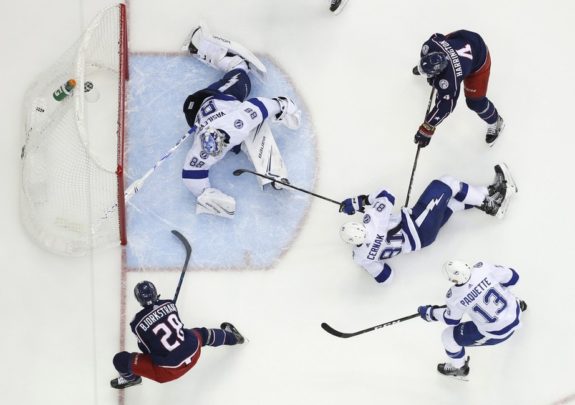In the 2019 Stanley Cup Playoffs, the Columbus Blue Jackets defeated the Presidents’ Trophy-winning Tampa Bay Lightning in a historic sweep. It was the first-ever franchise playoff series win for the Blue Jackets.

In the 2020 Stanley Cup Playoffs, they got a rematch with the Lightning. This time went much differently than last season’s success, though, as they found themselves on the receiving end of a loss with the Lightning taking the series, four games to one.
The biggest question is, what changed this season? This piece will break down the three biggest factors that changed for the Blue Jackets and led to the two different results.
Lots Factors Led to the Blue Jackets’ Loss
Much has changed for the Blue Jackets from last season, and many of those changes factored into the series loss.
The Blue Jackets Ran Out of Fuel
The biggest factor was they just simply ran out of fuel. In 2019, the Blue Jackets and Lightning started the series after the regular season, having played the same 82 games. This season, time on the ice was far from equal.
Related: What If? The Islanders, the Blue Jackets, Ryan Murray & the 2012 Draft
The Lightning played three round-robin games coming into the first round, one of which went to a shootout after a regular-season overtime period, which was five minutes long. The Blue Jackets landed in the qualifying round and ended up playing the maximum five games against the Toronto Maple Leafs, two of which went to overtime, which were postseason 20-minute sudden-death periods.

In the end, the Blue Jackets played nearly 100 minutes more than the Lightning leading up to the first round. By the time they landed in the first round, they already looked like they were running on fumes. Add the 5OT thriller in Game 1, and they looked exhausted, especially during Game 4 and at the end of Game 5, and just didn’t have the same energy against the Lightning as in 2019.
The Blue Jackets Lost Offensive Firepower
Another major factor in the Blue Jackets’ defeat was the loss of offensive firepower. In the offseason, they lost the talents of Artemi Panarin, Matt Duchene, and Ryan Dzingel.
Those three players combined for 84 goals total over the 2018-19 season. They also combined for a total of 213 points, including 12 in the 2019 Lightning series. They also had four players with more than 25 goals last season and three with more than 60 points.
This season, the Blue Jackets didn’t have a player with 25 goals or with 60 points. They only had two players with 20 or more goals and their leading scorer, Pierre-Luc Dubois, had only 49 points.
For comparison, the Lightning this season had four players with more goals than the Blue Jackets’ leading goal scorer. They also had four players with more points than Dubois.

The Blue Jackets lacked the same offensive ability as they did last season and didn’t have the capability to match up against the Lightning’s high-flying offense as they did in 2019.
Power Play Struggles Hit the Blue Jackets Hard
In the 2019 series, the Blue Jackets’ power play found their rhythm in the first round, torching the Lightning. They went 5-for-10 on the man advantage, propelling them to the series sweep.
Coming into this series, the power play was crucial for success, but ended up being nowhere near where it needed to be for them to be successful. They had no shortage of opportunities – the Lightning committed 22 minor penalties, but the Blue Jackets just couldn’t find a way to convert. They only converted three PP opportunities at a rate of just 14.3 percent in this series.
Related: Blue Jackets: Revisiting the Artemi Panarin Trade
The power play gave little help to the Blue Jackets, and in a series where all four losses were by only one goal, the man advantage was important. Their inability to score PP goals was a huge factor in this series loss. If they could have converted just a few more opportunities this series would have had a very different result, one similar to last season.
On to the Next Campaign
With today’s loss, the Blue Jackets’ season is over. It was an impressive run where a team that was written off before the season even started made their way to the first round. Not only that, but they did so with many of their starters injured and a mostly AHL roster for the majority of the season.
After the talent they lost and the injuries they sustained, to still make the playoffs is no easy feat. This run has centered John Tortorella as a front-runner for the Jack Adams Award. With the Blue Jackets being the youngest team in the NHL, it has also shown the franchise has a bright future.